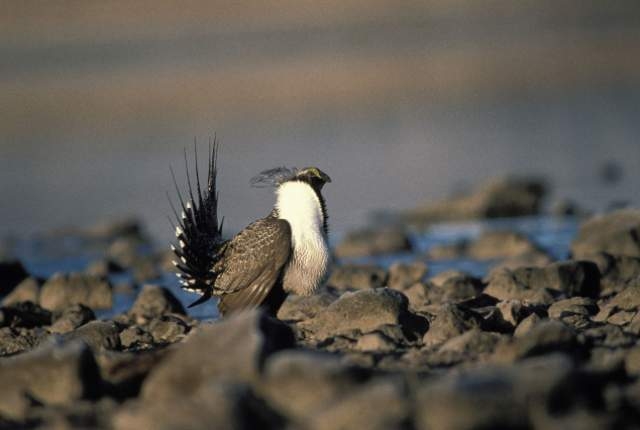Sage grouse decision good for Nevada, but hard work remains
The decision this fall by the U.S. Fish and Wildlife Service that greater sage grouse are "not warranted" for listing under the Endangered Species Act is a win for the bird and for Nevadans, including sportsmen, recreationists, ranchers, other private landowners and industry interests.
Our challenge now is to build upon conservation and restoration efforts underway — and set a course for continued responsible management of these valuable landscapes. The implications of a sage grouse Endangered Species Act listing would have been far more significant than any accommodations made thus far to keep it off the list. As it stands now, sage grouse management stays in the hands of the Nevada Division of Wildlife, much preferable to federal management and with the fringe benefit of continued sage grouse hunting seasons. In addition, ranchers will continue to benefit from opportunities to improve privately owned rangelands relied upon by the birds. No one gets everything they want in this process. However, it validates that, with hard work and collaboration, we can successfully tackle complex issues affecting our public and private lands — both in the West and nationwide.
Public lands hunters like myself understand that conserving and restoring a healthy, vibrant sagebrush ecosystem is critically important. This habitat, in Nevada and across the West, provides great opportunities to hunt not only sage grouse, but also mule deer, pronghorn, bighorn and elk. Approximately 350 species rely on these landscapes, making it even more crucial that we ensure responsible management.
Critters aren't the only beneficiaries of our actions; Nevada ranchers stand to gain, too. Sound management of sagebrush leads to healthier rangelands and healthier livestock in the long term. Conservation efforts facilitated by the Sage Grouse Initiative have helped 1,129 ranches and 4.4 million acres across the West, including the nearly 70,000 acres improved and 21 miles of fences marked here in Nevada. Additionally, the Natural Resources Conservation Service is committed to support the conservation of sage grouse, sagebrush habitat and financial help to ranchers through 2018.
The numbers speak for themselves. Nevada is 86 percent federal public lands, so the need for us to continue a productive relationship with the federal government regarding its management is paramount. In the face of challenges and potential conflicts, our state and the Interior Department have set a new bar for state-federal relations. We are proud of the proactivity of Gov. Brian Sandoval, the Sagebrush Ecosystem Council and NDOW for constructive, science-based input to provide USFWS with the needed certainty that habitat will be conserved. The conversations haven't always been easy, but they have been honest — and they have helped guide us as we work to achieve the common goal of conserving the sage grouse and upholding what is important to Nevadans.
In sum, September's "not warranted" decision is worth celebrating — for what it means for sage grouse and Nevadans who treasure our state's outdoor opportunities and our own family traditions. An endangered listing for the sage grouse would bring about even more federal government involvement — and undoubtedly increased land use restrictions. This is a situation we all have a stake in trying to avert.
Our continued engagement is critical, then, to keep the conservation actions of federal and state agencies, ranchers and other private landowners proceeding in a timely fashion. Ranchers need to continue the actions they already have begun on private lands and bring along neighbors to improve their operations. Sportsmen need to participate in the process, acknowledge the range of potential uses of these lands and ensure the continuation of balanced management, which conserves sagebrush habitat while also allowing reasonable development and access.
This collaborative approach to conservation is a game changer for the West, offering a path forward for settling natural resource conflicts that impact far more than sage grouse. Nevadans, including our state's hunters and anglers, are ideally situated to act as leaders. Let's resolve to stand together and support the hard and rewarding work that lies ahead.
— Chris Mero is chairman of the Nevada chapter of Backcountry Hunters & Anglers. He lives in Reno.

















